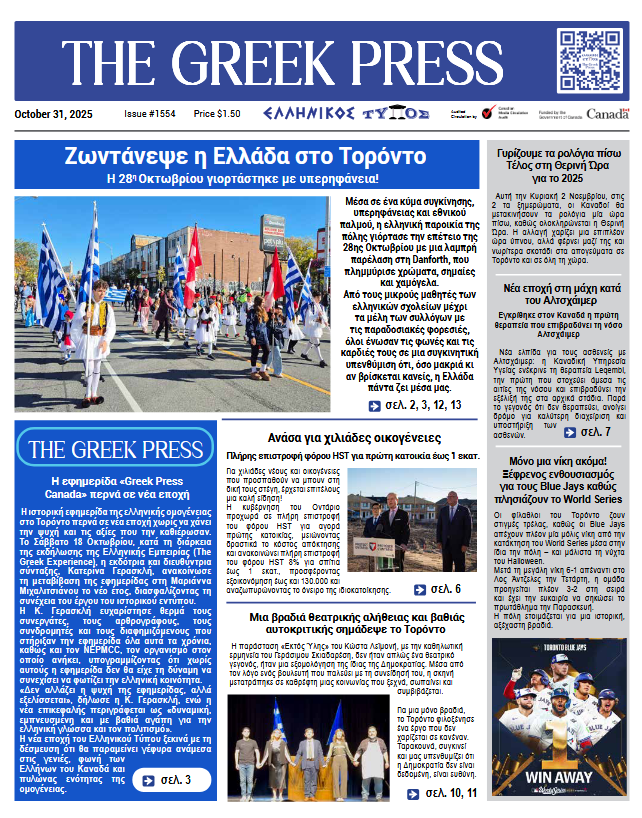 CLICK TO VIEW THE WHOLE PUBLICATION ONLINE
CLICK TO VIEW THE WHOLE PUBLICATION ONLINEpresented by Greek Press
Saturday October 4th, 2025 @ Carlton Imagine Cinemas
Written by: Patricia Gitersos
The topic of sexual abuse is never easy to address, especially when it involves children or when it forces one to examine closely held beliefs or cultural morals. As a staunch patriarchal society, Greece had to take a hard look at its social code during the #MeToo movement in 2020 when Sofia Bekatorou levelled sexual abuse accusations against the Hellenic Sailing Federation.
Sofia Bekatorou and Amalia Provelengiou are the proponents of the documentary film Tack, brave women who exposed their trauma and their lives to shine the light on rape and sexual abuse in a country that has long downplayed the issue. The legal and social storm that followed their accusations forced Greece to confront the issue, not just of child grooming in sport, but of abuse in every corner of society. It was without precedent in Greece’s history.
The writer and director of Tack, Vania Turner, is a Greek writer and filmmaker based in Athens who has filmed some of the most disturbing and brutal human crises in Africa and Europe during her career. She was living in Kenya at the time but came back to Greece just as the borders were closing when the pandemic hit.
Ms. Turner explained, “Sofia gave an interview in December of 2020, that’s when she spoke about her rape publicly for the first time. I met her a day before she went to the prosecutor in Athens. At that time, we didn’t know that we were making a feature film. We spoke about many things and then at the end she said that she was going to the prosecutor. And so, the next day at 6 am, I was at her house, and we made everything as we went along. I think meeting Sofia and then meeting Amalia, it became a longer project. When Amalia got her trial date a few months later, I had to stay and cover that until the end. I had been looking into sexism in Greece and gender issues when we initially reached out to her. I’d covered many humanitarian crises, and I’d spoken to rape victims. I thought that it was something that I was ready for, but I think there’s something about reporting in your own country…I didn’t expect that, and it was extremely traumatic.”
Casual sexism and stereotyping have always permeated Greek culture. These embedded stereotypes play a central theme in the film, not only in the abuse itself, but in how the victims are portrayed and how they are held up during the trials.
“I think growing up in Greece and experiencing that sexism myself on different levels, was the impetus in the beginning, growing up in Greece and understanding what girls and women go through. I thought we had made much more progress.
Sophia's decision to speak out created this seismic shift, and people started to talk about something that was being brushed under the carpet. People didn't talk about this stuff. And I think it forced people because Sophia was everywhere on the television for months. For a brief period of time, this is all people were talking about. It forced people to start talking. And it made people tell their parents or their friends or their relatives.
It's been really heartbreaking but also really powerful to see the film traveling throughout Greece because almost in every screening people have come up to me and shared their story of abuse which just shows how pervasive this sort of phenomenon is. It's really just everywhere.”
Ms. Turner says that in making the film, the hope is it will have the power to help others navigating the justice system, to show that they are not alone, and ultimately, to create a system for those that are finding the courage to speak out.
“This is a film that is very human at the heart of it. I was worried about what it would mean on a personal level. We had created this safe space in a world where it was just us. And then suddenly that opened up and there were screenings, and the film was released in festivals. But I was really relieved to see that the audience in general was really supportive.
They (Sophia and Amalia) were like family during the filming. Going to the court each time was really difficult just because you didn't really know what was going to happen and you were holding your breath for whatever was going to be said. But I think the hardest part came after the filming was complete because I had to sort through hours of footage. It was going through that process and making sure that everyone was going to be okay with it, consenting again to the film essentially. Going through the trial with them, I put myself in the back seat. I would listen, offer my support and then we would share stuff throughout, but they were the priority for me. Time had stood still for me during the filming and afterwards I had to go over everything, relive the whole thing and then craft a narrative out of 700 hours of footage, so it was a lot to go through.
For me, one of the best moments of my life was the afternoon when I watched it (the film) with Sophia for the first time and she said, ‘You did a good job.’”
Tack is being screened across in select cities during the Greek International Film Festival. Visit www.gifft.ca for more information on dates and locations.
*Article edited for clarity and length.































